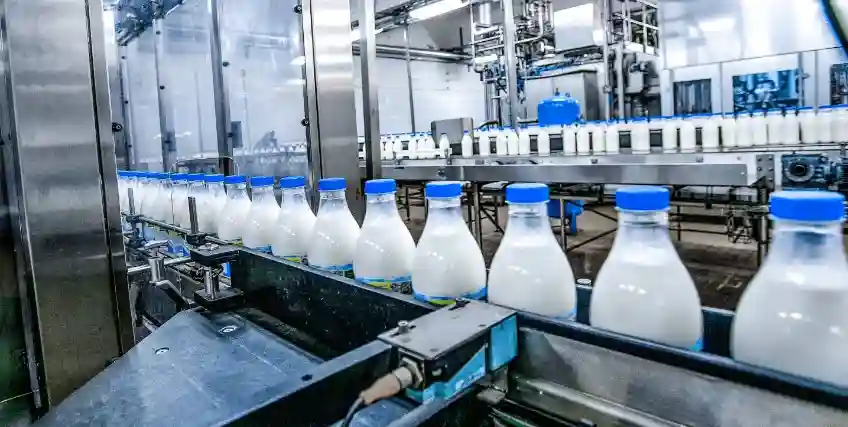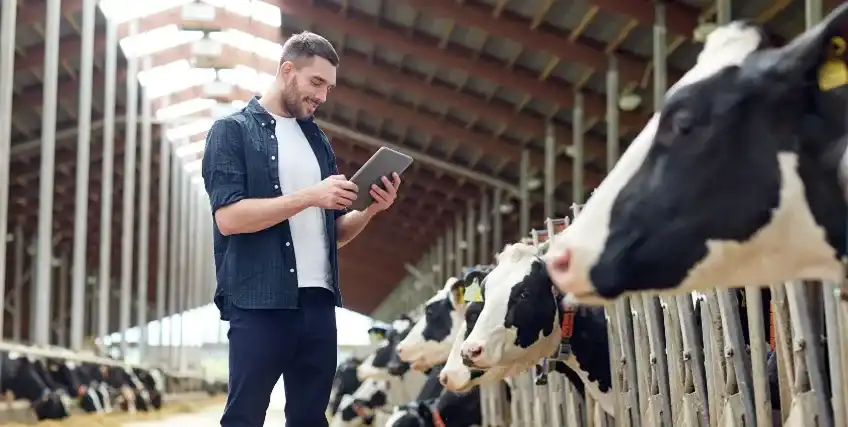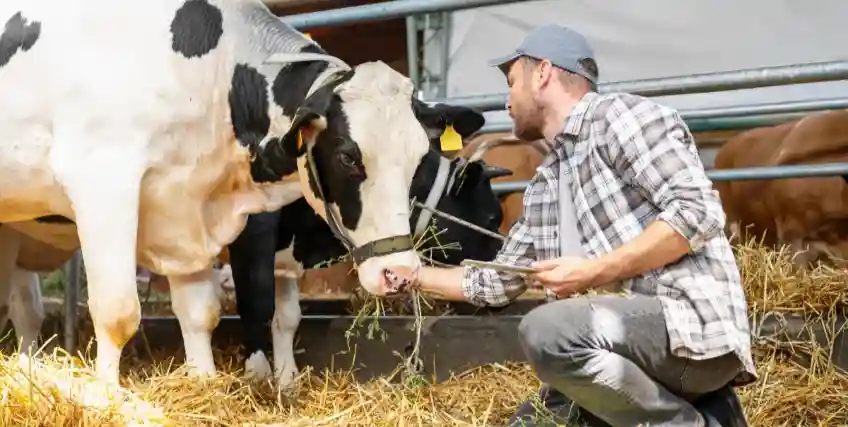Tips to Improve Your Chances of Getting a Dairy Farm Loan Approved
Oct 14, 2025 | Last Updated on: Oct 15, 2025

The agricultural industry is a tough one. Between seasonal revenue cycles, high costs, and an extremely competitive marketplace, dairy farmers need more financial support than the occasional subsidies. Securing a govt loan for dairy farming can be a vital step, whether you're starting a new venture or expanding an existing one. But like entrepreneurs in other industries, if you're going to apply for a dairy farm loan, you need to meet certain qualifications.
Lenders, whether they're commercial banks, Farm Credit institutions, or government-backed programs offering a govt loan for dairy farming, need assurance that the debt will be repaid. A strong, well-organized loan application package is one key to gaining their confidence. The best loan applications require meticulous financial preparation, a clear business strategy, and a proactive approach to addressing potential weaknesses. Whether you're applying for a govt loan for dairy farming or other agribusiness loans, let's take a look at practical tips to streamline the application process and increase your chances of approval.
In this article:
- Key tips to consider if you need help getting a loan.
- The best loan options, whether you're looking for working capital loans, govt loan for dairy farming, or more
- How to compare the best loan offers to find the right one for your small-scale operation.
1. Create an Impressive Business Plan
From startups to multigenerational dairy farms, one of the most important parts of any loan application is a business plan. This document serves as a farm's blueprint and a roadmap for its financial success. It shows lenders that the borrower understands the viability and profitability of the dairy operation, and has a clear vision for how to use the loan to increase profits.
A business plan should include:
- Executive summary: A concise, persuasive overview of your farm, the loan purpose, and how you will repay a private loan or govt loan for dairy farming.
- Operational Plan: Detailed account of the day-to-day management of the farm. You should include specifics on herd health protocols, milk production targets, feeding programs, labor management, and any innovation initiatives you're taking, from animal husbandry to cold storage improvements.
- Market analysis and strategy: An assessment of the dairy market that identifies your milk buyers, your competitive advantages, and your strategy for navigating market volatility.
- Financial projections: 3-5 years of financial projections that are realistic and based on sound industry benchmarks and historical performance. You should include projected income statements, balance sheets, and cash flow statements. This is what proves your ability to repay the govt loan for dairy farming or private loan.
- Risk management: Detail potential risks, such as disease outbreaks, milk price drops, or extreme weather, and clearly outline your contingency plans (such as insurance, feed reserves, or diversified income streams).
Whether you're applying for a govt loan for dairy farming through a govt source, a private loan through a traditional source, or an alternative form of funding from a Non-Banking Financial Company (NBFC), your business plan will play a big role in your approval chances.
2. Organize and Master Your Financial Statements
Lenders will conduct a thorough review of your financial history and current financial status. Providing clear, professionally prepared financial records is essential to demonstrate financial discipline and farm stability. Not only that but having organized application forms can help streamline the process.
The documents you should prepare will vary between lender and whether you're pursuing a conventional loan or a govt loan for dairy farming, but will almost always include:
- Historical tax returns: Personal and business tax returns for the past three to five years.
- Balance sheet: This snapshot of your assets and liabilities accurately values your real estate, equipment, and livestock. It's effectively a statement of net worth
- Income statement: This shows your profitability over a specific period.
- Cash flow statement: Lenders scrutinize this to see how cash flows into and out of your operation monthly. A stable cash flow is crucial for meeting loan payments.
3. Improve and Protect Your Credit Score
Your personal credit history (and business, if applicable) is one of the most important factors in any loan approval process. A good credit score can increase your approval chances and may translate to lower interest rates and better loan terms, especially for a govt loan for dairy farming. There are often minimum eligibility requirements, too, for traditional lenders, regional rural banks, and government loans for rural development.
Here are some practical steps you can take to improve your creditworthiness:
- Check your credit report: You can check your credit report at each of the three major credit bureaus weekly for free using com. If you see any errors, open a dispute to get them removed, as they can be unnecessarily dragging down your score.
- Pay down debt: Focus on reducing the balances on credit cards and other revolving lines of credit to lower your credit utilization ratio.
- Pay bills on time: Payment history is the most significant factor in your credit score. The simplest way to build your credit is by just making all of your monthly payments on time.
- Avoid new credit: Opening new credit accounts can have a temporary negative impact on your credit score, so it's best to avoid opening any unnecessary accounts before applying for a govt loan for dairy farming or other financing.
While some government loan programs, like certain USDA Farm Service Agency (FSA) direct loans, do not strictly rely on a credit score, they still require an acceptable repayment history with other creditors. A strong score is essential for most loans, however.
4. Define and Justify Your Funding Request
Lenders want to know how their money will be used and how those purchases will contribute to the farm's profitability and, ultimately, the loan repayment. As such, you should provide a detailed cost breakdown related to whatever your plans are for the loan. For instance, if you plan to make any major purchases, provide documented quotes or invoices. In addition, you should be able to explain the economic rationale behind each item. For instance, a new milking machine is a major expense, but it can be justified by its ability to increase efficiency, reduce labor costs, and improve milk quality. That can boost the credibility of the govt loan for dairy farming.
In many cases, you may have to provide collateral to secure the loan, too, such as farm real estate, equipment, or livestock. In such a case, you'll need to have details about the collateral so the lender can confirm the value and condition of the assets securing the loan.
5. Choose the Right Lender and Program
Not all lenders are created equal, especially when it comes to the specialized needs of a dairy operation. Researching and selecting the right lender is absolutely crucial. For many dairy farmers, especially those starting out or with limited credit history, a govt loan for dairy farming is often the best option. These include:
- USDA Farm Service Agency (FSA) Loans: The FSA offers Direct and Guaranteed Farm Ownership and Operating Loans. These are great resources for new farmers or those who can't qualify for traditional commercial credit.
- State-specific programs: Many state agricultural departments or development agencies offer localized loan or grant programs designed for specific types of farming, including dairy. Researching these can sometimes secure better terms or a necessary govt loan for dairy farming supplement.
There are many potential govt loans for dairy farming, but you should be willing to look beyond government programs. Both private lending and alternative financing can support your farm or dairy cooperative. If you're struggling to qualify for larger loans, consider applying for microloans (for a smaller loan amount) or equipment financing to get the specific equipment and machinery you need to meet goals.
Regardless of the type of loan you explore, it's important to understand the specific eligibility criteria and requirements. Knowing the minimum qualification requirements, collateral requirements, and terms and fees can help you save time.
Final Thoughts
Getting a dairy farm loan can be an exhaustive process, but it's certainly manageable. But it's not just about filling out forms. You need to show a well-crafted business plan, organized financial records, and a clear understanding of your funding needs to bolster your loan application. That's not to mention meeting the credit score, time in business, and annual revenue minimums that are often required for both private loans and a govt loan for dairy farming. In any case, you can significantly improve your chances of approval by taking a proactive , professional, and well-researched approach to the lending process.
FAQs About Govt Loan for Dairy Farming
1. What is the most important financial document a lender reviews for a dairy farm loan?
It depends on the lender, but a cash flow statement is often one of the most important documents. This statement demonstrates your farm's month-to-month ability to generate enough cash to meet all operating expenses and still repay the debt.
2. How important is my credit score for a government loan for dairy farming?
A good credit score is important to qualify for government-guaranteed loans (where in a commercial bank provides the loan, but the government guarantees a portion). For direct government-administered loans (like a USDA FSA Direct Loan), your credit score may not be the deciding factor. But you should still have a good repayment history with your creditors.
3. What is the Debt Service Coverage Ratio (DSCR), and what's a good target for dairy farms?
The DSCR measures the farm's ability to cover its debt obligations with its operating cash flow. It's calculated by dividing net operating income by the total annual debt service, which is the principal and interest.
It is calculated by dividing the Net Operating Income by the total annual debt service (principal and interest). Most lenders look for a DSCR of 1.25 or higher.
4. Should I include off-farm income in my dairy farm loan application?
Any additional income can help your application. Off-farm income, from a second job or a spouse's job, shows that you have a reliable secondary source of income with which to repay the loan. This reduces the lender's risk and improve your chances of qualifying for a govt loan for dairy farming.
5. What is the main benefit of pursuing a govt loan for dairy farming?
The main benefits of a govt loan for dairy farming, such as those from the USDA Farm Service Agency (FSA), are ample. Some include lower interest rates and more flexible terms compared to commercial loans.
Frequent searches leading to this page
Term Loans are made by Itria Ventures LLC or Cross River Bank, Member FDIC. This is not a deposit product. California residents: Itria Ventures LLC is licensed by the Department of Financial Protection and Innovation. Loans are made or arranged pursuant to California Financing Law License # 60DBO-35839




